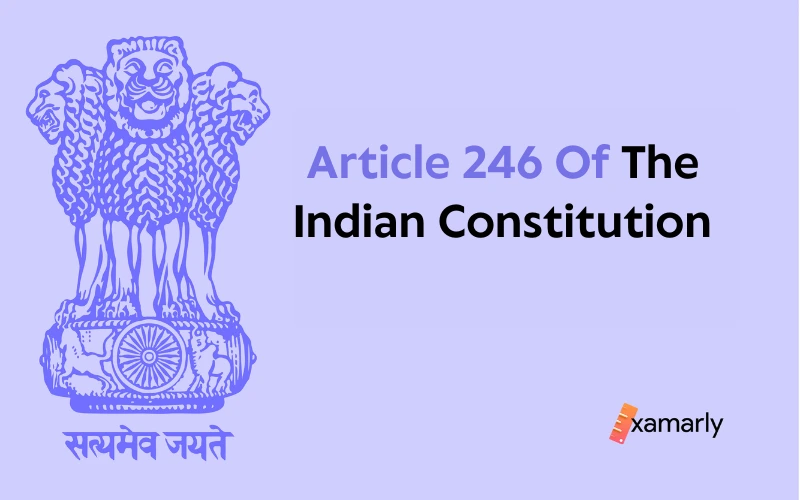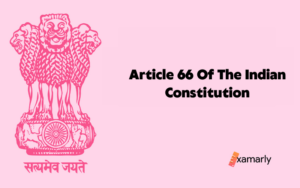Part XI of Article 246 of the Indian Constitution lays forth the fundamental tenets that determine how central and state governments are to be divided into functional units. Legislative relations and administrative relations are the two chapters that make up this part.
The Constitution of India lays out legislative jurisdiction in two distinct lists: one for the Central Government, and another for the states. The leftovers are in the Center. This strategy is comparable to that set forth in the Canadian Constitution. The Australian Constitution served as a model for the Indian Constitution’s adoption of the Concurrent List.
This page provides you valuable insight into Articles 246 and 246A of the Constitution of India.
- What Is Article 246 Of The Indian Constitution?
- What Is Article 246A Of The Indian Constitution?
- Scope Of The Phrase "With Respect To" In Article246A
- Which Amendment Has Inserted Article 246A?
- Article 246 and Article 246A are mutually exclusive
- Conclusion
- FAQs
- What Does The 101 Constitutional Amendment Act Mean?
- What Is Union List?
- What Is A Concurrent List?
- What Is State List?
- What Article 246 Of The Indian Constitution Deals With?
- What Article 246A Deals With?
- What Are The 3 Lists Of Article 246 Of The Constitution Of India?
- What Is Clause 5 Of Article 279A?
- Is Article 246 And Article 246A Mutually Exclusive?
- What Are The Constitutional Provisions Governing The Division Of Powers?
- Why Was Article 246A Inserted?
What Is Article 246 Of The Indian Constitution?
The subject of laws that can be passed by Parliament and state legislatures are covered under Article 246 of the Indian Constitution. The constitutional provisions of the Article stated before are outlined in the following 4 Clauses:
- Despite what is stated in clauses (2) and (3), Parliament has the exclusive authority to frame laws with respect to any of the issues included in List I of the Seventh Schedule, often known as the “Union List” in this Constitution.
- In spite of whatever may be said in clause (3), both Parliament and, so long as clause (1) is adhered to, the legislature of any state is able to make laws pertaining to any of the topics that are listed in List III of the Seventh Schedule (which is referred to as the “Concurrent List” in this Constitution).
- Subject to clauses (1) and (2), the legislature of any state has the exclusive power to establish laws for that state or any portion thereof with regard to any of the issues mentioned in List II of the Seventh Schedule (referred to as the “State List” in this Constitution).
- Regardless of whether a particular issue is one that is listed in the State List, Parliament has the authority to pass legislation pertaining to that issue for any area of Indian territory that is not incorporated in a State.
What Is Article 246A Of The Indian Constitution?
The specific provisions relating to the Goods and Services Tax (GST) in India are covered in Article 246A. Following are the two Clauses outlining the constitutional provisions of the aforementioned Article:
- In spite of the provisions of articles 246 and 254, Parliament and, subject to clause (2), the legislature of each State have the authority to pass laws governing the goods and services tax levied by the Union or by that State.
- Parliament has the exclusive authority to frame laws governing goods and services taxes where the supply of products, services, or both occur in the course of inter-State trade or commerce.
Explanation — In relation to the goods and services tax mentioned in clause (5) of article 279A, the provisions of this article shall go into effect on the day that the Goods and Services Tax Council recommends.
Scope Of The Phrase “With Respect To” In Article246A
Both P and SL have the authority to formulate laws “with respect to” the GST that applies to intrastate supplies, as stated in Article 246A (1) of the Constitution. The long-standing legal precedent suggests that making incidental provisions to facilitate tax collection is part of the authority to create laws with regard to a subjected tax, among other things. However, it’s crucial to determine whether the phrase “with respect to” is broad enough to encompass the authority to make an arrest or impose a fine with regard to GST offense(s) or if such extreme measures are not covered by it.
Which Amendment Has Inserted Article 246A?
The Union List and the State List are lists found in the Constitution that grant the Center and the States, respectively, the authority to collect separate taxes. In order for the Center and the States to have the authority to tax and collect GST, it has to be levied in a specific method. Additionally, the legislation had to be uniform across the State/Union Territory Legislatures and the Center. There ought to be a constitutional amendment to account for this.
The 101st Amendment to the Constitution of India, which was passed in 2016, inserted Article 246A into the Constitution and it went into force on September 16th of that same year. Article 246A deals with the special provisions regarding the Goods and Services Tax (GST) in India.
Article 246 and Article 246A are mutually exclusive
Along with adding Article 246A, the 101 CAA also eliminated or limited the scope of a few entries in the Seventh Schedule. After revision, Entry 54 of List II in the Seventh Schedule only allows for the assessment of sales tax on five petroleum goods. The question of whether the State can tax all other products under the guise of exercising its authority under Article 246A is an intriguing one.
The phrase “products and services tax” is used in Article 246A(1), and for convenience or otherwise, the phrase is defined in Article 366 (12A) as “any tax on supply of goods, or services, or both, save taxes on supply of alcoholic liquor for human use.” From a combined interpretation of both, it appears that Article 246A truly gives the government the authority to impose taxes on the supply of goods and services, with GST serving solely as a substitute.
Naturally, under Article 246A, State legislatures would be able to impose sales tax if supply is interpreted to include the occurrence of a sale. However, isn’t the ability to tax [sell] already being used because of the SGST Act’s ability to tax supply?
If the Constitution allows for the adoption of two distinct laws based on the same power, it would explain how the Medicinal and Toilet Preparations Act of 1955, which imposed a simultaneous excise duty in addition to the ordinary excise duty on Medicinal and Toilet preparations, survived and was followed by many more laws of a similar nature.
It is crucial to make reference to the Hon’ble Gujarat High Court decision in Reliance Industries Limited, where it was (rationally) noted that the authority granted by Article 246A cannot be divided in order to levy tax on the sale of products.
It is crucial to make reference to the Hon’ble Gujarat High Court decision in Reliance Industries Limited, where it was (rationally) noted that the authority granted by Article 246A cannot be divided in order to levy tax on the sale of products. Consequently, one can draw the conclusion that even while Article 246A does not comply with Article 246, the two articles are, to an extremely great extent, mutually exclusive to one another. To avoid the ludicrous liability imposed by the GVAT Amendment Act, the Court was formulating a counterargument, therefore we must exercise caution before interpreting the ruling as law.
Conclusion
The State Legislatures may pass laws on matters included in the State List, whereas the Union Parliament may pass laws on matters listed in the Union List. The power to legislate on topics that are included on the Concurrent List has been delegated jointly to the Union Parliament as well as to the legislatures of the individual states. Additionally, the Union Parliament was given the authority to pass laws on topics not included in any of the three lists.
In terms of the core foundation of the GST in India, Article 246A is without a question the most significant provision. The established historical principles appear to be at odds with the present power in some way. Trying to address the disagreements over competence amongst the legislative bodies, unintentionally creates cross-sectional disagreements. Examining what we sought to gain and what we did gain may be the ideal approach to Article 246A (or, for that matter, the entire 101 CAA). If Article 246A introduces absurdities that were not intended (such as double jeopardy and cross-sectional powers), a reading that avoids these errors should be upheld.
In the interest of further readings:
| Article 248 Of The Indian Constitution (Residuary powers of legislation) | Article 245 Of The Indian Constitution |
| Article 244 Of The Indian Constitution | 7th Schedule Of The Indian Constitution |
FAQs
What Does The 101 Constitutional Amendment Act Mean?
Goods and Services Tax, sometimes known as GST, is levied on the supply of goods, services, or both. After the 101 Constitutional Amendment Act was put into effect, it took the place of other indirect taxes in India.
What Is Union List?
The Union List is a compilation of the list of one hundred subjects in which the Union or Centre government has been granted supreme jurisdiction. It includes topics of National Importance including defense, foreign dealings, banking, atomic energy, railroads, and the post office, among others.
What Is A Concurrent List?
The concurrent list is a list of the topics over which both the Union and State legislatures have jurisdiction. It is one of three lists included in the Seventh Schedule to the Constitution and contains 47 items. It covers topics such as criminal legislation, criminal process, preventative confinement, woodlands, the protection of wild animals and birds, trade unions, industrial and labor disputes, etc.
What Is State List?
The state list is a list of 61 topics that are under the purview of state legislatures. It is one of three lists included in the Seventh Schedule to the Constitution. Public order, jails, public health, production, manufacture, transportation, purchasing, and sale of alcoholic beverages, agricultural education, and research, fisheries, state public services, etc. are some of the topics covered in it.
What Article 246 Of The Indian Constitution Deals With?
Article 246 of the Indian Constitution addresses the subjects of laws crafted by the state legislatures and by the Parliament.
What Article 246A Deals With?
This article is a new addition, and it was done so in order to grant the power to create laws regarding the Goods and Services Tax (GST) to the Parliament as well as to the relevant state and union legislatures. However, the sole authority to draft laws governing interstate supplies rests with the Indian Parliament. The IGST Act addresses supplies between states. So, only the Parliament will have the authority to frame laws under the IGST Act.
What Are The 3 Lists Of Article 246 Of The Constitution Of India?
Three lists are used in Article 246 to divide the state’s and the union’s authority. State List, Concurrent List, and Union List are such lists.
What Is Clause 5 Of Article 279A?
According to Clause 5 of Article 279A, the Goods and Services Tax Council is responsible for making a recommendation about the date on which the goods and services tax will be imposed on petroleum crude, high-speed diesel, motor spirit (also known as petrol), natural gas, and aviation turbine fuel.
Is Article 246 And Article 246A Mutually Exclusive?
The division of power between the Union and the States is covered in Article 246 of the Constitution. It provides a framework for the allocation of powers between the two levels of government and helps to ensure that the laws of the country are made at the appropriate level of government. It’s crucial to cite the Hon’ble Gujarat High Court decision in Reliance Industries Limited, where it was (logically) stated that the authority granted by Article 246A cannot be divided in order to levy tax on the sale of products. The conclusion that can be drawn from this is that even while Article 246A does not stand with Article 246, the two articles, to a very large extent, cannot coexist because they contradict one another.
What Are The Constitutional Provisions Governing The Division Of Powers?
Several Articles (Articles 245-254) of the Indian Constitution define how the Union and the States’ legislative power are to be apportioned between them. The most crucial and important of these provisions are, however, found in articles 245-246. The significance of Article 246 lies in the fact that it pertains to the subject matter of law.
Why Was Article 246A Inserted?
A scenario has emerged where it is necessary to ensure that the Union and States/UTs have concurrent legislative rights as a result of India’s adoption of a dual GST model, where a specific transaction is concurrently taxed by the Union and a State/UT. Article 246A was added to impose concurrent taxation powers on the Union and the States, including Union Territories with Legislature (Delhi and Puducherry), to adopt laws for the imposition of GST on every transaction involving the provision of goods or services or both. However, despite the fact that the statement of objects and reasons makes it apparent that the Constitution is being changed to include the goods and services tax in order to give the Union and the States concurrent taxing authority, article 246A does not expressly indicate that the legislation adopted by the Union and the States with regard to GST shall apply concurrently or simultaneously on the same transaction.






